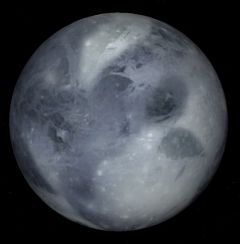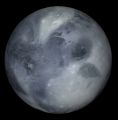Himalia
Revision as of 02:40, 8 August 2024 by Arvil (talk | contribs) (Arvil moved page User:Arvil/Sandbox02 to Himalia: Move to article page.)
 | This natural satellite related article is a stub. You can help Orbiterwiki by expanding it.
Himalia (Jupiter VI) is the is the largest irregular stellite and the sixth largest satellite of Jupiter. It was discovered by Charles Dillon Perrine at the Lick Observatory on 3 December 1904. Himalia was named after a nymph in Greek mythology who bore three sons by Zeus. Himalia in OrbiterHimalia was introduced to Orbiter with the release of jupiter-iii.zip in October 2002.
See alsoGallery
| ||||||||||||||||||||||||||||||||||||||||||||||||||||||||||||||||||||||||||||||||



